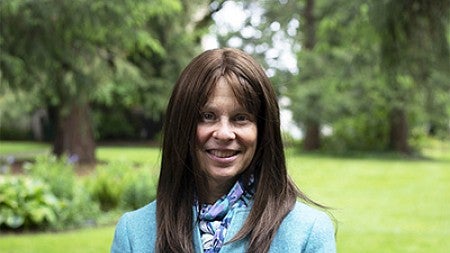
Environmental Studies
boulay@uoregon.edu | 541-346-5945
Courses: ENVS 429 Environmental Leadership Program, ENVS 427 Environmental and Ecological Monitoring, ENVS 411 Wolves in Oregon, ENVS 411 Ecological Restoration, ENVS 411 Understanding Place: the McKenzie Watershed, USGS 112: Environmental Leaders ARC Seminar
In my classes you will:
- Make connections to lived experiences and real-world challenges.
- Learn with and from peers.
- Develop a significant project that will challenge you and make you proud.
I was invited into the Teaching Academy because:
- I was a member of the Working Group on Active Teaching and Learning.
- I participated in the UO Summer Teaching Institute.
In what ways are you working to make your teaching inclusive?
In my team-based experiential courses, I emphasize that each student has unique and valuable skills, perspectives, and ideas to bring to the team’s work. I ask each student to identify and share their own strengths and learning goals, with the goals of empowering individual students, supporting peer learning, and leveraging team strengths. I carefully scaffold the team’s collaborative process through a project management plan and other tools, and I invite teams to continually evaluate what is going well and how their processes could be improved. In my UGST 112 course, I ask students to profile an environmental leader of their choice. I provide a list of inspiring people from diverse racial, ethnic, gender and socioeconomic backgrounds, and I provide the option for students to choose someone from their own life. I encourage students to think about environmental leadership broadly, recognize that leadership manifests in many ways, celebrate emerging leaders, and learn about people and issues they may not know about.
What do you do in terms of professional engagement with the teaching and learning culture on campus or nationally?
For my students and for myself, I believe in fostering a growth mindset, embracing life-long learning, and striving for continuous improvement through evaluation and innovation. I participate in at least one teaching development opportunity per term. I particularly enjoy the Science Literacy Program, a scientific teaching journal club that reads about, discusses and puts into practice evidence-based teaching methods. I appreciate the new ideas and inspiration I gain from the Teaching Engagement Program and Science Literacy Program events, but I particularly value the sense of community shared among faculty who care deeply about student learning. My teaching is focused on community-based experiential learning, and I have shared my methods and lessons learned at regional and national conferences.
In what ways was your teaching in this course research-led—informed by research on how students learn and inflected by UO's research mission?
I strive to use engaging, interactive, student-centered teaching methods. I emphasize field-based learning with frequent field trips in which students gain insights by collecting environmental data with a variety of tools, by participating in restoration or other projects, and by meeting people who are engaged with relevant issues. On campus, I break lectures into short segments woven together by case studies, questions, think/pair/share, problem-solving and group activities. Because I teach within an applied context, I describe how concepts and skills are used professionally. In my more science-focused courses, I teach research methods through field journals, data interpretation, literature syntheses, and research proposals. I use transparent assignment design by clearly articulating the purpose, requirements and grading rubric in the assignment description. The Working Group on Active Teaching and Learning taught me about backward course design, which was revelatory for me. That insightful workshop inspired me to redesign my ENVS 427 course to more tightly align all readings, activities and assessments to the course goals and learning outcomes.
Where do you find inspiration?
In nature, of course! In addition to teaching in the outdoors, I also relax and recharge through outdoor pursuits such as hiking, camping, backpacking, bird watching and mushrooming. I share my passion for natural history by volunteering as a nature guide for multiple organizations. I pay close attention to seasonal changes during my daily walk to campus, and I get some of my best ideas during these quiet moments.
What’s the most inspiring classroom moment you’ve experienced?
I have the privilege of working with caring, curious, and motivated students who truly want to make the world a better place. They continually impress, inspire and energize me. Relative to inspiring classroom moments, my favorite annual event is our Environmental Leadership Program Student Showcase, in which student teams present the results of their community-based projects to their community partners, their friends and family, and the Environmental Studies community. Their accomplishments are always extraordinary, and their pride and enthusiasm shines brightly.
